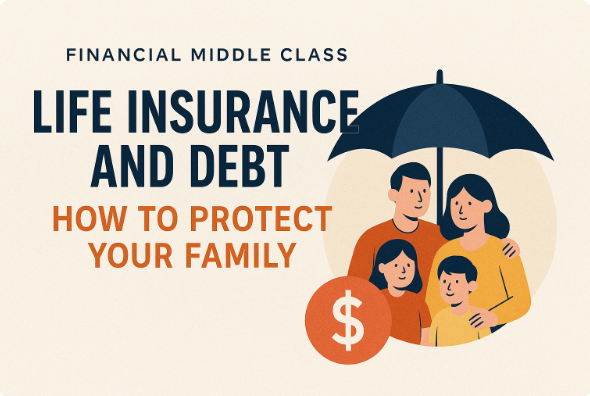No one likes to think about what happens when they’re gone, but the truth is unavoidable: debt doesn’t die with you. If you pass away owing money, creditors will often try to claim it from your estate. That means your loved ones could inherit stress instead of security.
This is where life insurance comes in — not just as a safety net, but as a shield that protects your family from debt collectors and ensures the legacy you leave behind is one of stability, not bills.
Why Debt Doesn’t Just Disappear
When someone passes away, their estate (everything they own) goes through a legal process called probate. During this time:
- Creditors line up first. Before your family receives anything, debts like credit cards, personal loans, or even unpaid medical bills may need to be settled.
- Co-signed loans linger. If you co-signed a car loan or credit card with your child, spouse, or friend, that debt automatically becomes theirs.
- Community property laws apply. In certain states, your spouse may still be on the hook for your debts.
The hard truth: without a plan, creditors could eat into the wealth you’ve worked so hard to build.
How Life Insurance Protects Your Family
Life insurance isn’t just about covering funeral costs — it’s about keeping your family financially whole.
- Pays off debts directly. Policies provide a tax-free payout that survivors can use to clear mortgages, car loans, or credit card balances.
- Protects inheritances. Instead of selling family assets to pay bills, life insurance ensures your loved ones can keep what matters most.
- Covers ongoing expenses. Beyond debt, payouts help with childcare, tuition, or household bills that don’t stop when you’re gone.
Types of Policies to Consider
- Term life insurance: Affordable coverage for a set period (10, 20, or 30 years). Perfect if you’re in your prime earning years and carrying large debts.
- Whole life insurance: More expensive but lasts a lifetime and builds cash value you can borrow against.
- Group life insurance: Often available through work — but don’t rely on it alone. If you change jobs, coverage usually ends.
When to Review or Update Coverage
Life changes, so should your coverage. Revisit your policy when you:
- Buy a home or refinance.
- Have children.
- Take on significant new debt.
- Experience income changes.
The Bottom Line
Debt may follow you after death, but with the right life insurance in place, it doesn’t have to follow your family. Insurance isn’t about fear — it’s about love. It’s a final act of financial care that ensures your family has a fresh start, not a financial mess.
Related Reads:
How to Minimize Debt Later in Life
Estate Planning for Millennials: Why It’s Not Just for the Elderly
Zero-Based Budgeting for Families: Planning Beyond Today
Creating an Emergency Fund in Retirement: Why It’s Essential for Protecting Your Nest Egg
Call-to-Action
If you don’t already have life insurance — or if you haven’t updated your coverage in years — start today. Get a quote, compare policies, and make sure your family is protected from debt long after you’re gone.
